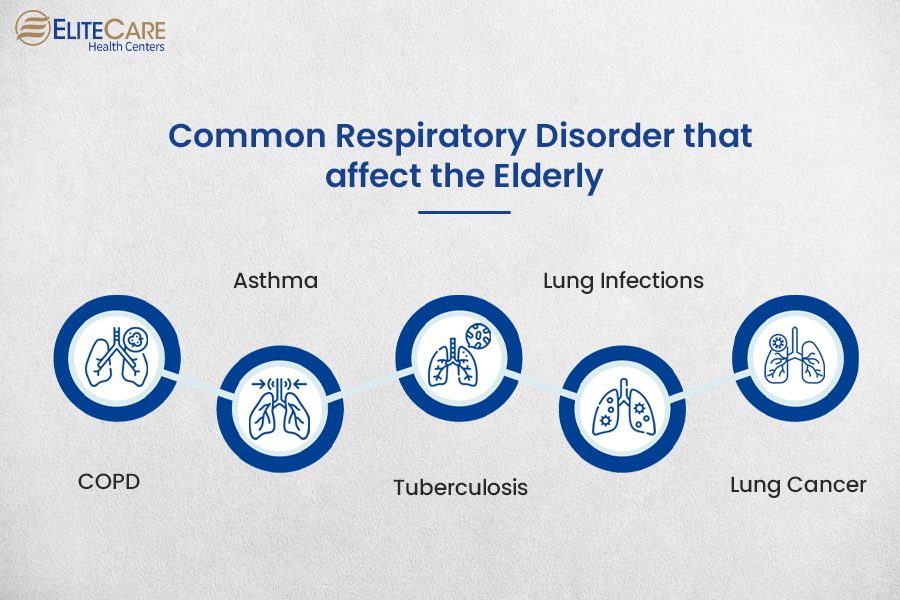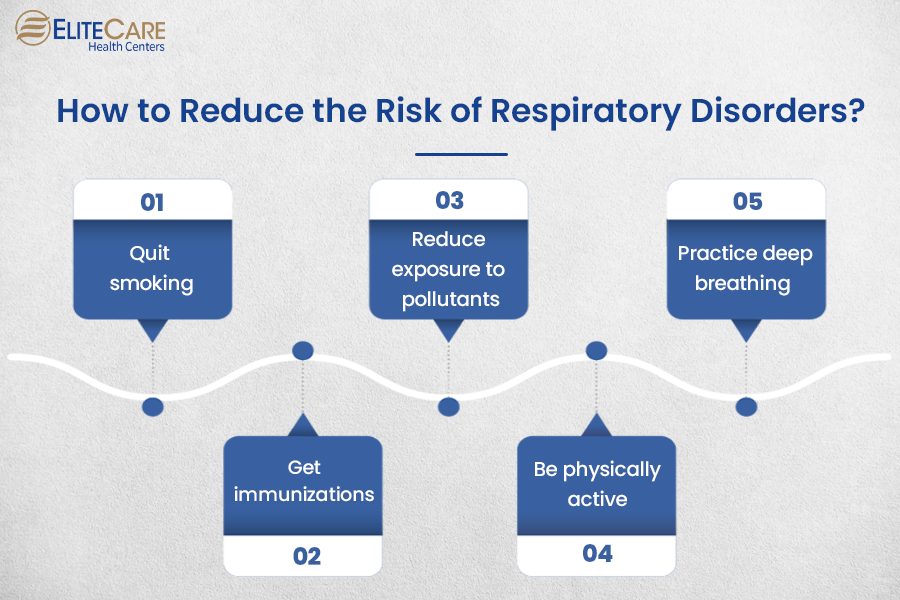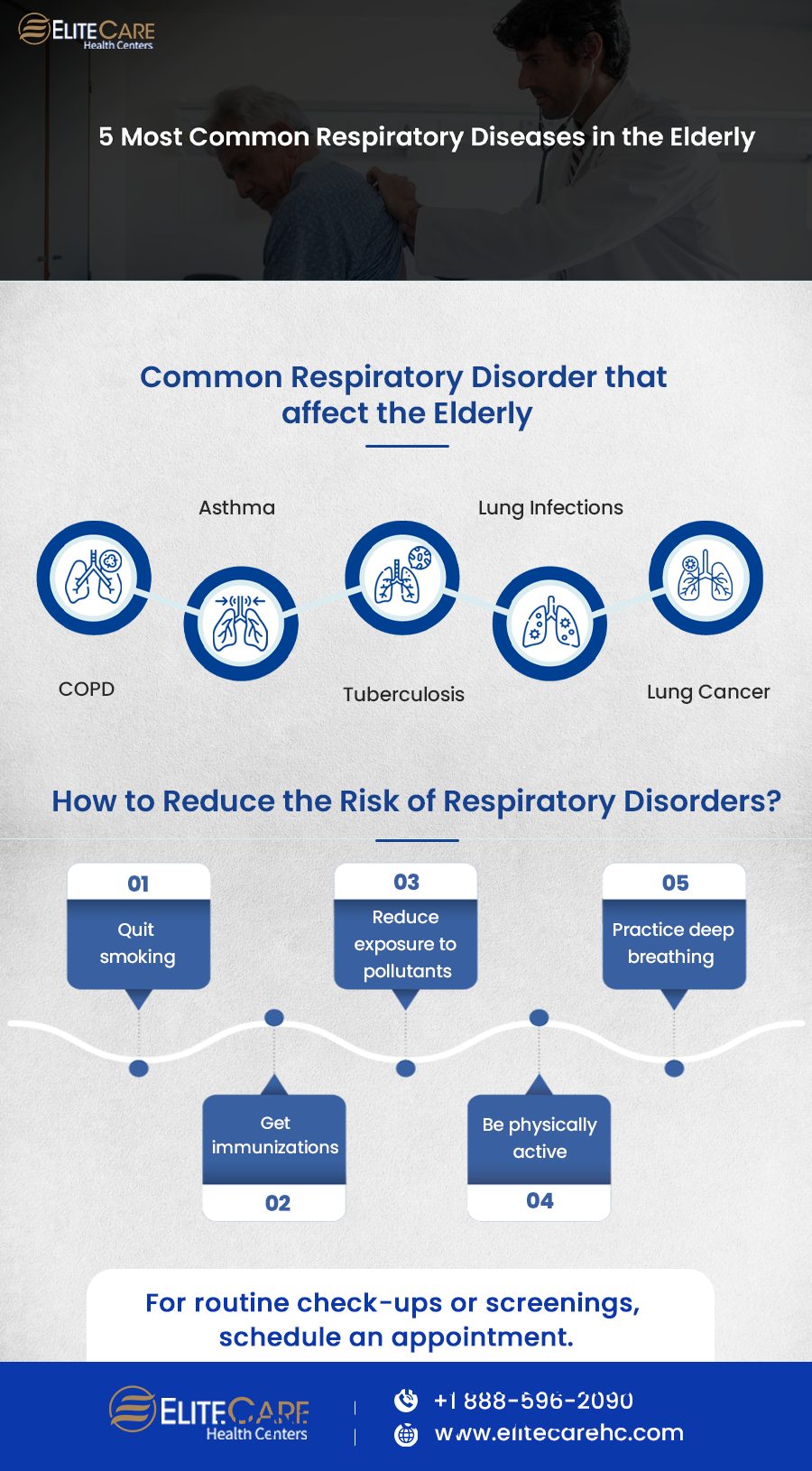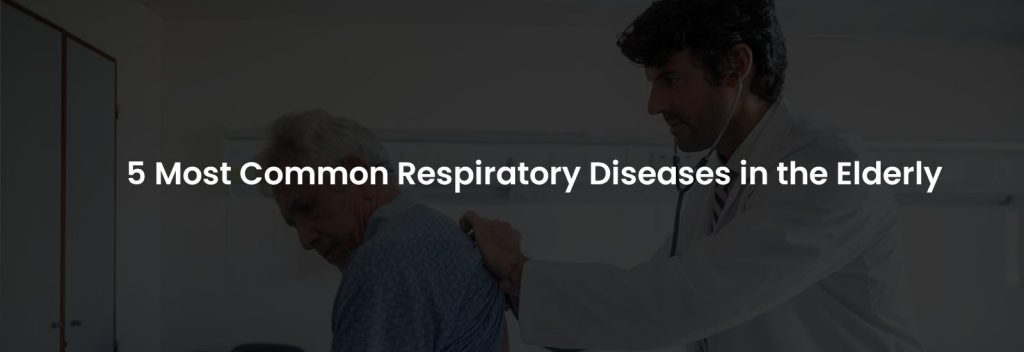
Respiratory disorders are pathological conditions that affect the lungs and the airways causing breathing difficulties. Older adults above the age of 60 are at increased risk of developing respiratory disorders. This is because as people age, the air sacs in the lungs lose their shape and muscles in the diaphragm weaken. This affects respiration and limits their ability to inhale and exhale.1 It also increases the risk of developing respiratory infections as seniors are unable to clear pollutants and pathogens from their airways through coughing. In the United States, 1 in 72 older adults suffer from respiratory disorders. It is one of the leading causes3 of death amongst people aged 65 and above.
Respiratory disorders can affect different parts of the respiratory system and present a range of symptoms that may vary from severe to mild. But some respiratory disorders are more common in older adults than others.
Read More: Everything You Need to Know About an EKG
5 Most Common Respiratory Disorders that Affect the Elderly

COPD (Chronic Obstructive Pulmonary Disease)
The term Chronic Obstructive Pulmonary Disease refers to diseases that affect the lungs and causes breathing difficulties. The main symptoms of COPD are coughing, wheezing, excess phlegm and shortness of breath. Older adults above the age of 60 are at an increased risk of developing this illness due to muscular deconditioning. The symptoms of COPD are also worsened by comorbid conditions like muscle weakness, congestive heart failure and other age-related health conditions. As of 2022, it is reported to be the sixth leading cause of mortality in the USA.
Lung Cancer
Lung cancer is a form of malignancy that affects the lung tissues. It is characterized by cough, chest pain, wheezing, shortness of breath, fatigue and weight loss. It is one of the most common types of cancer that affects the elderly. Seniors with lung cancer are typically diagnosed with the illness at an advanced stage, which leads to poor prognosis.
Asthma
Asthma is a chronic inflammatory condition that causes shortness of breath, wheezing, coughing and tightness in the chest. During an asthma attack, the lining in the airways swells and the surrounding muscles constrict. The inflamed bronchi then produce excess mucus which clogs up the airways, causing breathing problems and wheezing. Although asthma symptoms usually present themselves in childhood, it is not uncommon for senior citizens to develop the condition after they hit 60. Asthma can be particularly deadly for senior citizens as the mortality rate of the disease is much higher for older adults than their younger counterparts.
Read More: Debunking 5 Common Myths about Heart Health in Women
Tuberculosis
Tuberculosis is a bacterial infection that spreads through droplets from the cough and sneezing of an infected person. It is caused by Mycobacterium tuberculosis. The main symptoms of tuberculosis are coughing up blood, chest pain, fever and weight loss. While the overall incidence of tuberculosis has decreased in the last 20 years, the number of seniors affected by the disease has increased significantly. Tuberculosis is extremely prevalent in people aged 65 and above; this could be linked to age-related reactivation of lesions that have remained dormant for several decades. Active tuberculosis is associated with 7% mortality within the first year of diagnosis for senior citizens.
Read More: 5 Ways for Seniors to Have a Healthy Heart
Lung Infections
Lung infections like pneumonia and bronchitis affect the air sacs and bronchi of the lung. Symptoms of pneumonia are chest pain, cough, fever, fatigue and lower-than-usual body temperature. Symptoms of bronchitis include cough, chest pain, fatigue and body ache. Pneumonia is usually caused due to a bacterial infection, whereas bronchitis is caused by the virus that is responsible for the flu. Seniors with weakened immune systems and other comorbidities have a very poor prognosis for pneumonia. As for chronic bronchitis, the illness can cause permanent lung damage and requires lifelong treatment.
How To Reduce the Risk of Developing Respiratory Disorders?

- Quit Smoking
- Reduce exposure to pollutants
- Get immunizations for the flu and COVID
- Get more exercise
- Practice deep breathing
Read More: What to expect from an annual physical exam?
Conclusion
Respiratory disorders disproportionately affect older adults. Poor immune systems and weakening muscles paired with age-related changes that cause nasal passages to become less cartilaginous can increase the risk of respiratory disorders and infection in the elderly. It is important, therefore, to get flu shots and routine physical exams to detect any potential health concerns early. Consult a physician with a specialization in respiratory therapy for more help.
If you or an elderly loved one is suffering from age-related decline in respiratory health, visit the nearest EliteCare clinic for check-ups or screenings. Visit this website to schedule an appointment.






